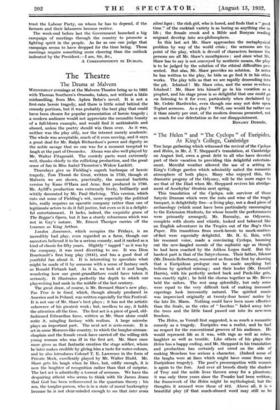The Theatre
The Drama at Malvern
WEDNESDAY evenings at the Malvern Theatre bring us to 1695 with Thomas Southern's Oroonoko, taken, not without a little mishandling, from Mrs. Aphra Behn's novel. It is not a first-rate heroic tragedy, and there is little mind behind the comedy portions, but it was probably'the best play that could have been chosen for popular presentation of heroic tragedy ; a modern audience would not appreciate the recondite beauty of a full-blown example, and would find it unthinkable and absurd, unless the poetry should win them over. As it was, neither was the play silly, nor the interest merely academic. The whole was acceptable, much of it even moving, and it says a great deal for Mr. Ralph Richardson's power and dignity as the noble savage that no one was for a moment tempted to laugh'at the part of Oroonoko. Aboan was also well played by Mr. Walter Fitzgerald. The comedy parts went extremely well, thanks chiefly to the rollicking production, and the great sense of fun in Miss Isabel Thornton's Widow Lackitt.
Thursdays give us Fielding's superb burlesque of heroic tragedy, Tom Thumb the Great, written in 1780, though at Malvern we are shown, practically, the musical burletta version by Kane O'Hara and Arne, first produced in 1780. Mr. Ayliff's production was extremely lively, brilliantly and wittily decorated by Mr. Paul Shelving. This version, which cuts out some of Fielding's wit, more especially the political hits, really requires an operatic company rather than one of legitimate actors to do it full justice, but even so it is a delight- ful entertainment. It lacks, indeed, the exquisite grace of The Beggar's Opera, but it has a sturdy robustness which was not in Gay's nature. Mr. Ernest Thesiger carries off the honours as King Arthur.
London Assurance, which occupies the Fridays, is an incredibly bad play, even regarded as a farce, though our ancestors believed it to be a serious comedy, and it ranked as a kind of classic for fifty years. Slightly " ragged " as it was by the company, it was most diverting to see. It was Dion Boucicault's first long play (1841), and has a good deal of youthful fun about it. It is interesting to speculate what might be made of it by someone with a sense of fantasy such as Ronald Firbank had. As it is, we look at it and laugh, wondering how our great-grandfathers could have taken it seriously. It illustrates perfectly the depth to which our playwriting had sunk in the middle of the last century.
The great draw, of course, is Mr. Bernard Shaw's new play, Too True to be Good, which, though already produced in America and in Poland, was written especially for this Festival. It is not one of Mr. Shaw's best plays ; it has not the artistic coherence of his greatest work ; but, needless to say, it holds the attention all the time. The first act is a piece of good, old- fashioned Edwardian farce, written as Mr. Shaw alone could write it, mingling fantasy with realism. A large microbe plays an important part. The next act is serio-comic. It is set in some Morocco-like country, to which the burglar-airman- chaplain and the female crook have carried off the willing rich young woman who was ill in the first act. Mr. Shaw once more gives us that fantastic creation the stage soldier, whom he later makes credible by giving him a taste for water-colours, and he also introduces Colonel T. E. Lawrence in the form of Private Meek, excellently played by Mr. Walter Hudd. Mr. Shaw gets his laugh when he likes, but, oddly enough, it is now the laughter of recognition rather than that of surprise. The last act is admittedly a torrent of sermons. We have the despairing atheist who seems to think with Sir James Jeans that God has been rediscovered in the quantum theory ; his son, the burglar-parson, who is in a state of moral bankruptcy because he is not clear-minded enough to see that inter arma silent legei ; the rich girl, who is bored, and finds that a " good time" of the cocktail variety is as boring as anything else in life ; the female crook and a Bible and Bunyan reading sergeant develop into sex-philosophers.
In this last act Mr. Shaw approaches the metaphysical problem by way of the world crisis ; the sermons are the point of the play, which is devoid of characters because the persons are all Mr. Shaw's mouthpieces : and since what Mr. Shaw has to say is not, conveyed by aesthetic means, the play is to be judged by the solution of the ethical difficulties pre. seated. But alas, Mr.. Shaw provides no solution. In notes he has written to the play, he bids us go find it in his other works. The play tells us that we are rapidly descending into the pit. Ichabod I Mr. Shaw cries, and the scene re-echoes Ichabod Mr. Shaw lets himself go in his vocation as a prophet, and his stage prose is so delightful that one could go on listening to it for ever, particularly when declaimed by Mr. Cedric Hardwicke, even though one may not dote upon Tophet sermons. As a play ? Well, one would far rather see it than ninety per cent, of the modern dramas presented, not so much for our delectation as for our disappointment.
BONAMY DOBRIkE.






























 Previous page
Previous page